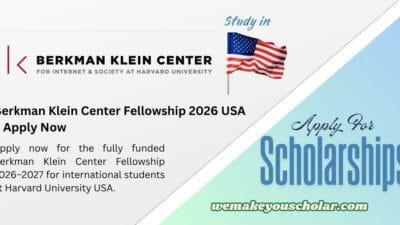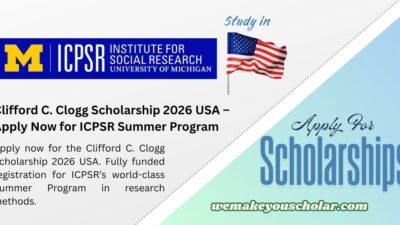France — Toulouse University Capitole IAST Research Fellowships 2026–2028 (Fully Funded)
The Institute for Advanced Study in Toulouse (IAST) at Université Toulouse Capitole runs a prestigious two-year postdoctoral program designed to support high-quality, interdisciplinary research across the social and behavioral sciences. These fellowships are highly competitive and attractive because they combine focused time for research, an interdisciplinary environment, and institutional support that helps early-career researchers accelerate their academic trajectory. Fellows receive a contract in France, office space, participation in seminars and workshops, and optional Marie Skłodowska-Curie sponsorship support.
Who should read this post
- Recent PhD graduates (PhD completed between Dec 2022 and Sep 2026)
- Early-career researchers in anthropology, economics, political science, psychology, sociology, evolutionary biology, history, philosophy, and related disciplines
- Researchers aiming to get a fully funded postdoc in Europe with interdisciplinary exposure
- Applicants considering the Marie Curie Fellowship route with IAST sponsorship
What this post includes
- Eligibility & selection criteria
- Complete application checklist & writing-sample strategy
- Tips to write a standout cover letter and CV
- Recruitment timeline & what to expect after applying
- Funding, contracts, living costs in Toulouse, and Marie Curie option
- FAQs & internal resources
About IAST and Université Toulouse Capitole
The Institute for Advanced Study in Toulouse (IAST) is an interdisciplinary research hub hosted by Université Toulouse Capitole. IAST brings together social and behavioral scientists working on cutting-edge questions in human behavior, institutions, markets, networks, and historical processes. The institute is known for fostering cooperation across fields — economists collaborate with anthropologists, psychologists engage with political scientists, and historians use quantitative methods alongside sociologists. For research-driven postdoctoral scholars, IAST offers a lively intellectual community with seminars, workshops, and a yearly research retreat.
Interdisciplinarity as a core strength
IAST’s main selling point is interdisciplinarity. Fellows are encouraged to step beyond narrow disciplinary boundaries to produce research that speaks to multiple audiences — policy-makers, academics across disciplines, and broader public readership. This environment is particularly beneficial for scholars working at the intersection of methods (quantitative & qualitative) or across subject areas (e.g., political economy of health).
Fellowship details & benefits
Duration & contract
The fellowship provides a two-year employment contract (CDD) in France. The contract enables fellows to focus full-time on research without teaching overload, while participating in IAST seminars and events.
What’s included
- A competitive stipend / salary under French CDD rules
- Office space and computing facilities
- Access to academic seminars, workshops, and the annual research retreat
- Networking opportunities with faculty and international visitors
- Potential sponsorship and preparation support for Marie Skłodowska-Curie Fellowship applications (if indicated at application)
Note: Salary scales and exact benefit packages vary; check the official page for precise terms. The CDD contract ensures social security coverage in France.
Who is eligible?
IAST aims to attract early-career researchers. The core eligibility criteria include:
- PhD timing: Completed or expected between December 2022 and September 2026. Candidates finishing between October and December 2026 may have the fellowship start date postponed.
- Career stage: Early-career researchers who are not in tenured or tenure-track positions at the time of application.
- Research fit: Strong record in a relevant discipline (social & behavioral sciences) and a commitment to interdisciplinary collaboration.
- Nationality: Open to all nationalities — IAST encourages applications from underrepresented groups and researchers from the Global South.
Special cases
If you completed your PhD before December 2022, you may still apply but must provide a clear justification in the cover letter describing why the fellowship is essential at this career stage.
Eligible fields & sample research topics
IAST welcomes applications across a broad range of fields. Typical disciplines and topic areas include — but are not limited to:
- Anthropology: cooperation, conflict, demography, health, aging, diet, global health
- Economics: microeconomics, development, game theory, behavioral & experimental economics
- Political Science: political economy, institutions, policy studies, networks
- Psychology: moral behavior, AI ethics, social learning, human-machine cooperation
- Sociology: social networks, inequality, polarization, mobility
- History & Quantitative History: economic history, social/political history using empirical methods
- Evolutionary Biology & Behavioral Ecology: social evolution, cooperation models
- Philosophy, Mathematics & Computational Social Science: work that complements empirical research
If your project crosses two of these domains — for example, economic history using quantitative methods with a behavioral component — emphasize interdisciplinarity in your cover letter.
Application procedure — step-by-step
IAST uses an online application portal (link in the Apply button). Below is a practical checklist and how to assemble each piece effectively.
Required documents (in English)
- Curriculum Vitae (CV) — clear, academic-style CV (max 2–3 pages recommended; include education, publications, working papers, teaching, awards, and relevant conference presentations).
- Cover letter (max two single-spaced pages) — crucial: explain the project, research questions, relevance to IAST’s mission, and longer-term career objectives.
- Two writing samples — examples of published papers, working papers, or book chapters. Choose pieces that showcase your best methods and conceptual strengths.
- Contact details of three referees — name, title, email. The portal will email referees directly for recommendation letters.
Recommendation letters
Recommenders receive an automatic request. Confirm with your referees ahead of submission so they meet the recommendation letters deadline (Nov 30, 2025). Strong letters speak to both the candidate’s research ability and their capacity for interdisciplinary collaboration.
How selection works
Applications are reviewed by a selection committee composed of senior researchers and previous fellows. Key selection vectors:
- Quality of research proposal & writing samples
- Publication/working paper record and evidence of research progress
- Fit with IAST’s interdisciplinary mission
- Potential for future impact and career trajectory
Shortlisted candidates may be invited for a Zoom interview (mid-January to early February 2026). Final decisions are typically announced in mid-March 2026.
Application timeline (key dates)
- Application Deadline: November 15, 2025
- Recommendation letters deadline: November 30, 2025
- Zoom interviews: Mid-January to early February 2026
- Final decisions: Mid-March 2026
- Fellowship start date: September 2026
Note: If you plan to pursue the Marie Curie route, indicate your interest in the cover letter — IAST can provide sponsorship support, which follows the same selection timeline.
CV checklist — make reviewers’ lives easy
- Clear contact info & ORCID (if available)
- Education with thesis title and advisor
- Publications (peer-reviewed first) and working papers
- Conference presentations & invited talks
- Teaching & supervision (concise)
- Awards, grants, and relevant research experience
- Technical skills (programming, languages, fieldwork experience)
Interview stage — what to expect
Shortlisted candidates will be invited to a Zoom interview. Typical format:
- Presentation (10–15 minutes): Outline your research plan and main contributions.
- Q&A (20–30 minutes): Committee asks about methods, timelines, and fit with IAST.
Prepare to explain clearly how you will use IAST resources and with whom you plan to collaborate.
Marie Skłodowska-Curie Fellowship option
If you intend to apply for a Marie Curie Fellowship (MSCA Postdoctoral Fellowship) with IAST sponsorship, indicate it clearly in your cover letter. IAST can provide institutional support and guidance for the MSCA application, but note that the MSCA selection process runs on its own timeline and criteria; being selected as an IAST fellow does not guarantee MSCA funding. However, joint planning and early alignment can strengthen both applications.
Practical tips to improve your chances
- Target clarity: Make your research questions crystal clear at the start of the cover letter.
- Interdisciplinary language: Avoid jargon. Explain technical methods succinctly for a mixed-discipline committee.
- Show progress: Demonstrate publications, working papers, or pilot data to indicate feasibility.
- Referees: Choose recommenders who can speak to your independence, interdisciplinary potential, and ability to finish research within two years.
- Timeline: Provide a realistic timeline with deliverables for Year 1 and Year 2.
- Networking: Mention seminars, research groups, or IAST faculty members you’d like to engage with (specificity signals fit).
Common reasons strong applications fail
- Unclear research goals or methods
- Weak or outdated writing samples
- Recommendation letters that don’t address independence or research potential
- Poorly justified need for the fellowship at this career stage
Internal links — related posts on WeMakeYouScholar
You may also like:
Warwick PGR & Chancellors Scholarships 2026 | Fully Funded PhD UK
Lancashire University Country Group A Scholarship 2026 for International Students
Bursary Award 2026 at University of Edinburgh (Fully Funded for UK Students)
Frequently Asked Questions (FAQs)
Q1: What is the application deadline?
A1: The application portal closes on November 15, 2025. Recommendation letters must be received by November 30, 2025.
Q2: Can I apply if I finished my PhD before December 2022?
A2: You can apply if you provide a strong justification in your cover letter explaining why the fellowship is necessary at this career stage. Early-career is the target; exceptions are possible but need explanation.
Q3: Is the fellowship open to non-European citizens?
A3: Yes — the fellowship is open to all nationalities. IAST encourages applications from underrepresented groups and researchers from the Global South.
Q4: Do fellows teach during the fellowship?
A4: The primary goal is research. While light teaching or seminar contributions may occur, the contract is intended to allow focused research time.
Q5: Can I use this fellowship to apply for the Marie Curie Fellowship?
A5: Yes — you may indicate MSCA Marie Skłodowska-Curie interest in your cover letter. IAST can provide sponsorship and support, though MSCA selection is separate.
Closing thoughts — how to frame your application
IAST fellowships are competitive because they attract talented candidates from around the world. Your task is to make the committee see two things clearly and quickly: (1) your research is excellent and feasible, and (2) IAST’s interdisciplinary environment is the best place to do it. Be concrete, avoid discipline-specific jargon without explanation, show evidence of progress, and choose recommenders who will vouch convincingly for your independence and potential. If you follow the structure above, you’ll have a competitive application ready for the November 15, 2025 deadline.
Good luck — and if you want, we can draft or edit your cover letter/CV and review your writing samples for maximum impact.
Official Link:
For further details, please visit the official website.




